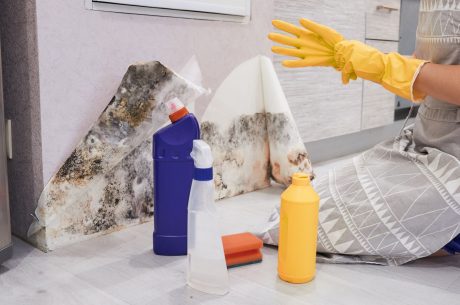Mold growth can be a real issue for Florida homeowners. With high humidity and frequent rain, Florida provides the perfect environment for mold to thrive. Mold not only damages your home but also poses health risks to you and your family. That’s why it’s essential to know how to keep mold out of your home.
Mold spores are always in the air, waiting for the right conditions to start growing. When moisture, warmth, and organic material are present, mold can spread quickly. You might notice mold as black, green, or white spots on walls, ceilings, or floors. It can make your home smell musty, and prolonged exposure can cause respiratory problems and allergies.
In this article, we’ll explore how to understand mold and its dangers, identify the common causes of mold in Florida homes, implement effective mold prevention strategies, and take appropriate steps if you discover mold in your home. Understanding these aspects can help you keep your home mold-free and your family safe.
Understanding Mold and Its Dangers
Mold is a type of fungus that grows in damp, warm environments. It can be found both indoors and outdoors and is especially common in humid areas like Florida. Mold reproduces by releasing tiny spores into the air. These spores can land on surfaces and grow when they have moisture, warmth, and a food source like wood, drywall, or carpet.
Mold poses several dangers to both your home and health. It can cause structural damage as it breaks down building materials. Mold can also create stains and produce a musty odor that can be difficult to eliminate. But the more serious concern is the health risks. Breathing in mold spores can lead to respiratory issues, allergies, and asthma attacks. Symptoms can include coughing, sneezing, eye irritation, and skin rashes.
Certain types of mold, like black mold, are particularly dangerous as they can produce toxic compounds called mycotoxins. For people with weakened immune systems or preexisting health conditions, exposure to mold can be especially harmful. Understanding the dangers of mold underscores the importance of keeping it out of your home.
Common Causes of Mold in Florida Homes
Several factors contribute to mold growth in Florida homes. Understanding these causes can help you take preventive measures:
- High Humidity: Florida’s climate is very humid, particularly during the summer. High humidity levels create the perfect environment for mold to thrive. When indoor humidity exceeds 60%, it becomes much easier for mold to grow.
- Leaky Roofs and Pipes: Water intrusion from roof leaks or plumbing issues can lead to mold growth. Even small, slow leaks can create enough moisture for mold to develop over time.
- Poor Ventilation: Homes with inadequate ventilation are more prone to mold problems. Bathrooms, kitchens, and laundry rooms without proper exhaust fans can trap moisture, which promotes mold growth.
- Flooding: Florida is prone to heavy rains and hurricanes, which can cause flooding. Water from floods can saturate walls, floors, and belongings, creating ideal conditions for mold to grow.
- Condensation: When warm, humid air comes into contact with cooler surfaces like windows, pipes, or walls, condensation forms. This moisture can lead to mold growth if it’s not dried promptly.
By identifying and addressing these common causes, you can take steps to mitigate the risk of mold in your Florida home.
Effective Mold Prevention Strategies
Preventing mold from growing in your Florida home involves taking proactive steps to control moisture. Here are some effective strategies:
- Control Humidity Levels: Use dehumidifiers to keep indoor humidity levels below 60%. Air conditioners can also help reduce humidity. Regularly check your home’s humidity levels, especially in damp areas like bathrooms and basements.
- Ensure Proper Ventilation: Install exhaust fans in bathrooms, kitchens, and laundry rooms to reduce moisture. Open windows when possible to allow fresh air to circulate. Proper ventilation helps keep moisture levels down.
- Repair Leaks Quickly: Fix any leaks in your roof, walls, or plumbing as soon as you notice them. Even small leaks can lead to significant mold problems if left unaddressed. Regularly inspect areas prone to leaks.
- Clean and Dry Spills Promptly: Any spills or water infiltrations should be cleaned and dried within 24-48 hours. This helps prevent mold spores from finding the moisture they need to grow.
- Use Mold-Resistant Products: When renovating or building, consider using mold-resistant drywall, insulation, and paints. These products are designed to inhibit mold growth and can provide added protection.
Implementing these strategies can go a long way in keeping mold out of your home. Regular maintenance and vigilance are key to preventing mold problems before they start.
What to Do If You Discover Mold in Your Home
Discovering mold in your home can be alarming, but taking the right steps can help mitigate the damage and health risks. Here’s what you should do:
- Identify the Source: Find out where the moisture is coming from and address it immediately. Fix any leaks or water issues to stop further mold growth.
- Protect Yourself: When dealing with mold, wear protective gear such as gloves, a mask, and goggles. This helps you avoid breathing in spores or coming into direct contact with mold.
- Contain the Mold: Close off the affected area to prevent mold spores from spreading to other parts of your home. Use plastic sheeting to seal off doorways and vents.
- Remove Damaged Materials: Discard any porous materials, like drywall and carpets, that are infested with mold. Non-porous items, such as glass and metals, can be cleaned and dried thoroughly.
- Clean and Disinfect: Use water and detergent to clean hard surfaces. Avoid using bleach on porous materials as it may not penetrate deeply enough to kill mold roots effectively. Thoroughly dry all cleaned areas.
- Monitor for Recurrence: After cleaning, keep an eye on the affected area for any signs of mold returning. If you notice mold coming back, it may be best to consult a professional.
Taking these steps can help you manage mold problems effectively and keep your home safe.
Conclusion
Keeping mold out of your Florida home requires vigilance and proactive measures. From understanding the dangers of mold to identifying common causes and employing effective prevention strategies, each step plays a crucial role. Addressing mold problems promptly ensures a healthy living environment.
Florida’s humid climate makes mold prevention all the more critical. Regular maintenance and quick action against moisture issues are your best defenses. By staying informed and prepared, you can protect both your home and your health from the impacts of mold.
If you encounter persistent mold problems or need professional assistance, PuroClean of Naples is here to help. Our team offers comprehensive mold removal services to ensure your home remains mold-free. Contact us today to safeguard your home and health.




 PuroClean of Naples
PuroClean of Naples